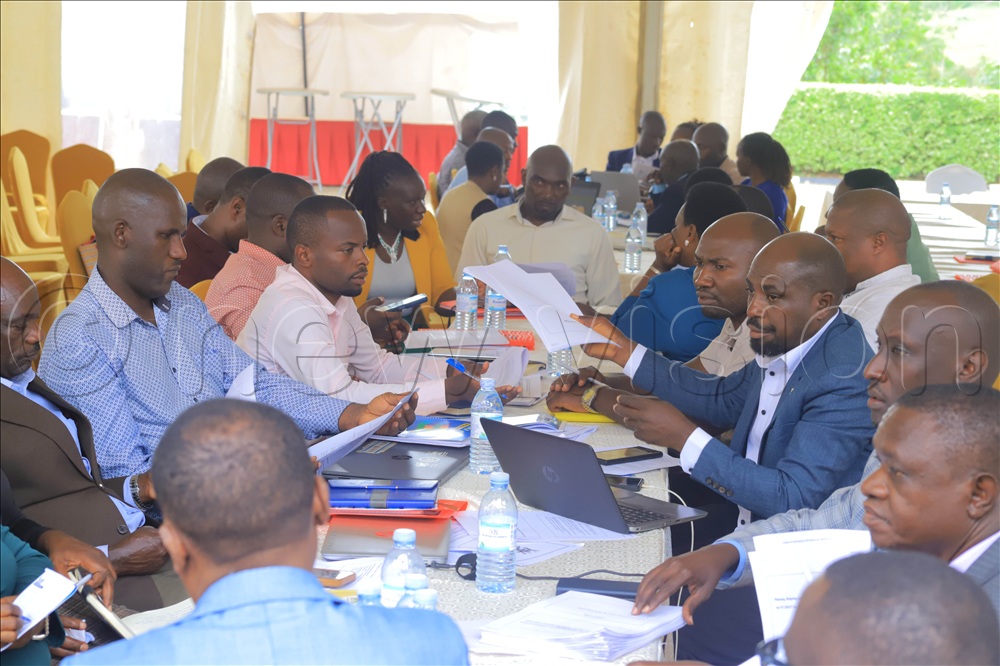Why leaders want govt to allocate budgets based on district size
The leaders say the standard budget allocation doesn’t favour them, especially in addressing challenges faced in their communities.
Leaders from districts of South western region attending the regional local government budget consultative workshop held at Lake View Hotel in Mbarara City. (Photos by Abdulkarim Ssengendo)
________________
Local government leaders from districts in the western region have urged the finance ministry to give special consideration to large districts during budget allocation.
The leaders say the standard budget allocation doesn’t favour them, especially in addressing challenges faced in their communities.
Isingiro district chairperson Alone Turahi gave an example of the shillings one billion road fund allocated to each district, noting the money has led to unfair distribution and inadequate service delivery in districts like his, which covers the more complex areas of 30 sub-counties.
“Districts with a big area of coverage like Isingiro should get double or triple what smaller districts are getting in terms of funds allocation. Voters are complaining that we are not working for them because they see small districts in the neighbourhoods delivering services because the funds they get are more than enough to answer their needs, like working on the roads,” Turahi says.
Kyenjojo Resident District Commissioner Julian Ayesiga Saraha raises the same complaint citing her district, which has 889 villages, 167 parishes and 31 lower local government, but they are also getting shillings one billion for the road fund, which she says is 'purely unfair'.
“We are getting concerned about funds that are being sent to districts, especially under roads. Districts like Kyenjojo with 31 sub-counties, are getting one billion, and you find districts with 10 or fewer sub-counties getting the same funding. It is very unfair and the Government should consider increasing funding for these big districts,” Ayesiga adds.
The leaders raised their concern during a two-day regional local government budget consultative workshop at Lake View Hotel in Mbarara City, which ended on Tuesday, September 23, 2023. It was officially opened on Monday by Hannington Ashaba, the acting director budget, who represented the finance minister.
Responding to leaders, Ronald Reagan Namanya, the senior policy analyst at the works ministry, informed them that they have already prepared a Cabinet submission to negotiate an allocation formula of the one billion.

“We will have a pool of shillings 176 billion. There are areas we are looking at the network distance, the conditions of those roads and those peculiar issues like the terrain, issues of being vulnerable to climate change, distance to gravel and other issues," Namanya explained.
Salary imbalance concerns
The leaders also asked the government to find a solution to the issue of salary imbalances.
“The mayor is getting shillings one million, health assistants are getting 2.5 million and yet a mayor is a chief monitor. How do you supervise and manage? “I don’t know what you are doing and the kind of calculations you are doing,” Charles Makuru, mayor for Rukungiri municipality, stated.
Finance minister implores district leaders
Finance minister Matia Kasaija, through Ashaba, implored district leaders to be keen to ensure that their budgets are in line with the priorities of the Government to grow the economy tenfold through strategic investments in ATMs and enablers.
The minister also promised to take a keen interest in their challenges and the agreed solutions that will contribute to the development of appropriate interventions in the FY 2026/27 and the medium term. He implored all accounting officers to help their respective political leaders to effectively participate in the budget preparations and execution process.
Six local governments warned over failure to submit draft plans
Out of the 176 local governments, six (Bugweri, Butebo, Buvuma, Gomba, Kalungu and Luuka) haven’t submitted their first draft plans to the National Planning Authority (NPA). NPA planner regional and local government development planning Swaliq Kisige Isabirye attributed this to lack of commitment, prioritisation, and some are not co-operative.
He warned that NPA will not issue certificates of approval to these local governments, and they will write to the finance ministry for corrective action and will also publish these local governments' boards, which will compromise their reputation and affect their budgeting processes.